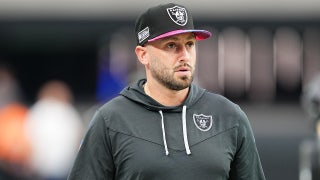SAN FRANCISCO – Graeme McDowell joined an exclusive club Sunday.
No, not the one for two-time U.S. Open champions.
McDowell's missed birdie putt from about 25 feet on the historic 18th hole at The Olympic Club landed the Northern Irishman a silver medal and a poster that will hang in the stately clubhouse next to some of golf's greatest from generations past. That's where runners-up at this quirky course end up.
For McDowell's sake, hopefully the rest of his career doesn't go the same way.
In another dramatic finish at Olympic Club, Webb Simpson saved par from the rough on the 18th to close at 2-under 68 in a foggy final round and move McDowell and Michael Thompson into that group of silver medalists: Arnold Palmer, Ben Hogan, Tom Watson and Payne Stewart.
The 32-year-old McDowell's putt to force an 18-hole playoff never even had a chance. He pushed it left and took a long, slow walk to tap in for the most disappointing par of his life.
"There's a mixture of emotions inside me," said McDowell, who closed with a 3-over 73. "Disappointment, deflation, pride. But mostly, just frustration."
History has not been kind to runners-up at this San Francisco staple.
In one of the more bizarre coincidences in golf, three of the four players who finished second at the oldest athletic club in the United States were Hall of Famers who never won another major. The other, Stewart, won the U.S. Open the following year at Pinehurst, then died in a freak plane crash that fall.
That accident is not why members call this place a "graveyard for champions."
It's another, far less serious kind of heartbreak on the undulating Lake Course that has made unforgiving Olympic so famous.
Palmer lost a seven-shot lead to Billy Casper with nine holes to go in 1966. Jack Fleck topped Hogan in an 18-hole playoff at Olympic in 1955. Scott Simpson won by a stroke over Watson in 1987, and a gust of wind blew Lee Janzen's ball back to the ground minutes after it landed in a cypress tree on the fifth to help him best Stewart in 1998.
Now add McDowell's name to those little black books in Olympic Club's second-floor archives with the other major champions that settled for sliver.
"This is sort of a new experience for me, I suppose, finishing second at a major championship," said McDowell, who won the U.S. Open two years ago down the California coast at Pebble Beach. "I would rather have tried and failed than have never tried at all. I think someone fairly familiar must said that."
About the only consolation prize for McDowell — other than that $695,916 check — was being bested in the loser's circle by a meltdown from another player on the leaderboard who tumbled even farther.
Jim Furyk, the 2003 U.S. Open champion at Olympia Fields outside Chicago, bogeyed the final three holes to finish two shots back of Webb Simpson. While history might remember Furyk's foiled finish more than anybody, the last image of the 112th U.S. Open belongs to McDowell's putt.
What should also be remembered is this former major champion's fight all week on a course that restored "golf's toughest test."
The only round above par McDowell carded was the last. He bogeyed four holes on the front nine and made the turn seemingly out of contention and lost in the fog that blanketed these tight, twisting fairways.
McDowell rallied with back-to-back birdies on Nos. 11 and 12 only to bogey the next two. As he had done all week, he put himself back in the hunt.
McDowell holed a 20-foot birdie putt on the 17th in one last fury. He followed with an approach shot on the 72nd hole of this championship that had him sprinting up the hill to find out where his chances of extended an excruciating week at least one more day.
That was one obstacle he couldn't overcome.
"It's like a really fast, scary roller coaster that you get on at the time and you're not sure if you like it and it's kind of scary," McDowell said, recalling a conversation he had with his caddie, Ken Combo. "But once it's done and you look back, you realize that you had a lot of fun and you would like to do it again, and that kind of sums up what it's like to compete on the big stage at a major championship.
"So it hurts. You want it really badly, you practice so hard to be there and it hurts when you're there. But when it's all done you think back and you think, I would like to do that again."
___
Follow Antonio Gonzalez at: www.twitter.com/agonzalezAP








































